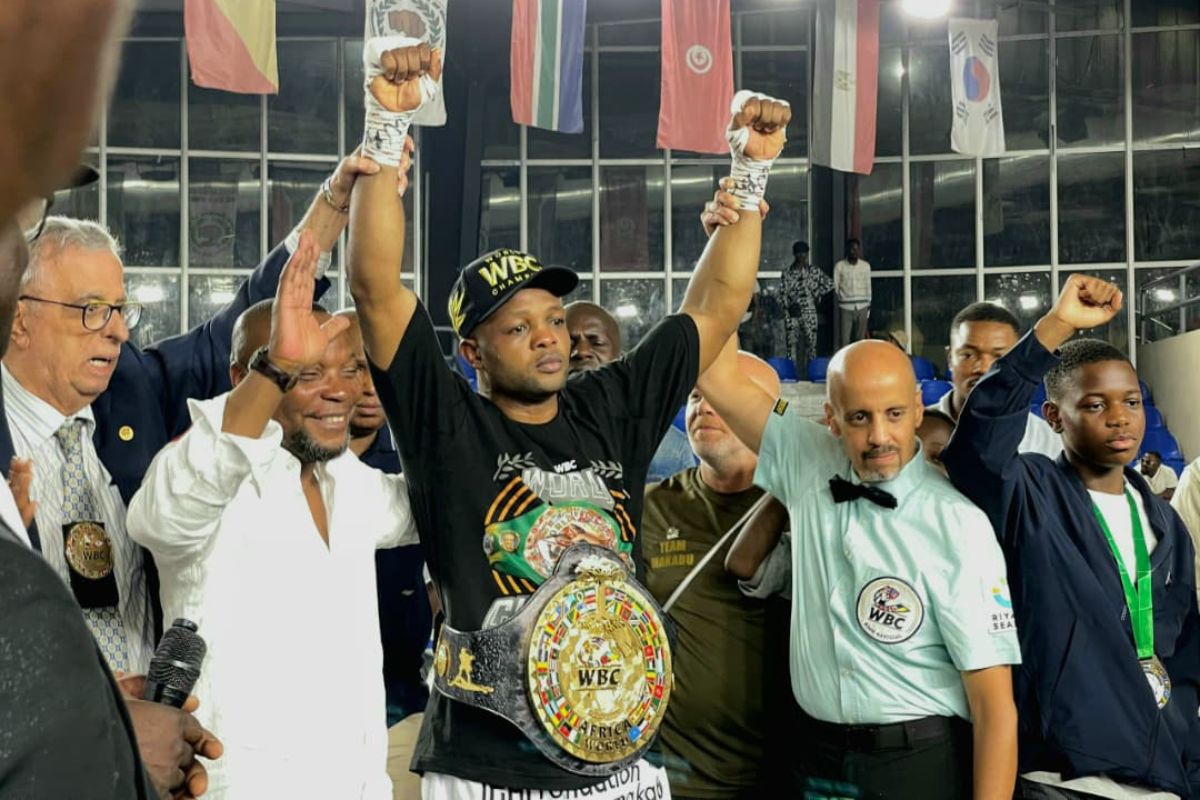Ilunga Makabu WBC Africa Cruiserweight Title Defense will be remembered in Kinshasa for its blend of precision, power, and pride. On September 5, 2025, at the storied Stade des Martyrs, the Congolese cruiserweight stopped Ghana’s Dodzi Kemeh after three punishing rounds, igniting a roar from a home crowd that came to see their former world champion rise again.
The night carried the unmistakable charge of a hometown showcase, and Makabu embraced it with a patient opening. Organised by Luyoyo Promotions, the contest began with the Congolese southpaw assessing range, drawing energy from an atmosphere that felt both intimate and immense.
Then came the first real jolt. Late in the opening round, Makabu detonated a thumping left hook, a shot that rattled Kemeh and signaled the tone for what was to follow, a reminder of the punching power that once carried him to the sport’s summit.
Kemeh met that moment with defiance. The Ghanaian stepped forward in round two and strung together clean punches, briefly testing the favorite’s composure and forcing Makabu to show his poise under pressure.
Makabu’s answer was measured and crisp. He countered with timing, placing short shots through the guard and reasserting control, each reply calming the swell that Kemeh had tried to create in the exchanges.
The turning point arrived in the third. Makabu began to step around and let the left hand flow, and a series of heavy hooks to the head left Kemeh reeling, the crowd in full voice, the momentum no longer in doubt.
When the bell sounded for the fourth, the outcome was already written. Kemeh could not continue, and the referee waved it off, a stoppage that reflected both the damage inflicted in that decisive third and the efficiency with which the champion closed the show.
This defense meant more than another tick in the win column. Makabu first claimed the WBC Africa title in Kinshasa in December 2024, and retaining it again at home deepened the bond between fighter and city, a shared celebration of resilience and craft.
It also sharpened his trajectory. The victory reaffirmed Makabu’s status on the continent and revived his push toward a world crown, a path that naturally points toward reigning champion Badou Jack and the elite company Makabu is eager to rejoin.
Every fight tells a story of adjustments, and here the details were clear. Makabu’s left hook was both early warning and finishing tool, Kemeh’s surge in the second asked questions, and the champion’s counters answered them with composure.
The setting mattered too. The bout formed part of the WBC’s Year of Africa celebrations, and the turnout at the Martyrs Stadium, hundreds strong and utterly engaged, underlined how Kinshasa continues to claim its place on the global boxing map.
There was a rhythm to the performance. Makabu eased into the contest, drew a reaction, then seized the initiative with those explosive hooks, the sequence reflecting a veteran’s feel for pace and a finisher’s sense of the moment.
Kemeh’s role deserves recognition. He refused to fold after the first-round shock, pushed forward in the second, and landed cleanly enough to force the champion into high concentration, a contribution that made the eventual breakthrough more meaningful.
In the end, power and patience converged. The left hand that punctuated round one returned with greater force in round three, and the accumulation was evident when the corner could not answer the bell, a conclusion that said as much about sustained pressure as it did about any single punch.
Makabu’s connection with Kinshasa added a layer no neutral venue could replicate. The chants, the colors, and the sheer warmth of support fed his confidence, and the fighter responded in kind, delivering a performance calibrated to the moment and the place.
Organisers will take satisfaction from the outcome as well. Luyoyo Promotions curated a stage that felt both celebratory and competitive, a card aligned with the WBC initiative that spotlighted African boxing in a city that lives and breathes the sport.
For fans tracking the bigger picture, the implications were straightforward. A dominant continental defense keeps Makabu active, visible, and credible as a challenger, and it reinforces a narrative that points him back toward the world-title lane.
There are technical takeaways from the three completed rounds. The timing of the counter left, the discipline behind the guard, and the refusal to rush the finish when the openings first appeared all speak to a veteran’s ring IQ and confidence in his power.
Kinshasa, for its part, delivered on its reputation. The energy inside Stade des Martyrs shaped the evening, from the measured hum of the first bell to the crescendo that met the stoppage, a living soundtrack to a concise and emphatic win.
For Kemeh, this will be a hard lesson that can still serve as fuel. He showed ambition and heart, he attempted to flip the narrative in the second round, and he forced Makabu to find cleaner, sharper answers before the momentum turned decisively against him.
For Makabu, the message reverberated beyond the final bell. The WBC Africa cruiserweight belt remains in familiar hands, and the performance suggested that the tools that once took him to a world throne are polished and ready for another climb.
As the crowd filtered out, the feeling in the air was renewal. The champion gave his city a statement win, the continent took note under the WBC spotlight, and the wider boxing conversation gained a compelling reminder of Makabu’s relevance.
Call it a win of layers, a stop-start first act followed by a definitive close, and a night that restored both momentum and expectation for a fighter whose goals extend far beyond one belt.
Power established the terms, composure carried the middle, and a corner retirement confirmed the finish, a clean arc that speaks to a champion in command.
How the fight was won
Makabu’s approach was simple and effective. He steadied his tempo behind counters, then used the heavy left to disorganize Kemeh, a pattern that turned a competitive start into a one-sided conclusion.
- A disciplined first round gave Makabu reads and angles,
- Kemeh’s forward surge in the second demanded sharper counters,
- The barrage of left hooks in the third ended the argument.
What it means for the world stage
The victory cements continental dominance and strengthens the next move. A refreshed pursuit of a world title now feels tangible, with the target of Badou Jack looming as the natural next step in a renewed campaign.
The timing could not be better. As the WBC spotlights African boxing, Makabu has supplied a performance that travels, a stoppage that resonates with matchmakers and fans who judge momentum as much as reputation.
The Kinshasa effect
There is a reason fighters crave home nights like this. The synergy between athlete and city multiplies small advantages, and when the moment of truth arrives, confidence becomes its own kind of force.
Kinshasa responded to every feint, flurry, and finish. The stadium saw a champion who has returned to his roots and rhythm, and it celebrated like a city that understands how quickly a career can pivot on a single surge.
Final word
This was brief, bracing, and beautifully managed. From the first left hook that shook the opening frame to the corner retirement that signaled the end, Makabu delivered clarity in motion, a performance that justified the buzz and amplified the stakes to come.
The WBC Africa cruiserweight title stays in the hands of a hometown hero. More importantly, the path ahead looks bright, and after Kinshasa’s latest boxing night, few will doubt that Makabu’s ambitions still carry real weight.






